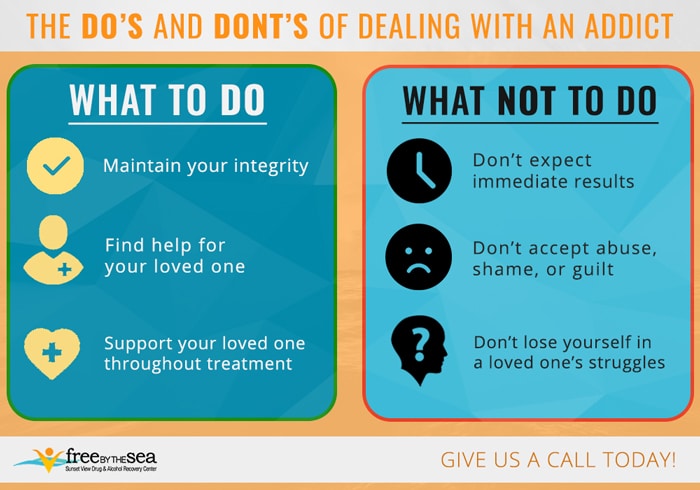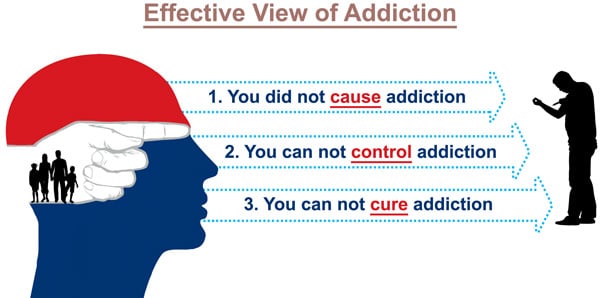One of the most difficult challenges for anyone struggling with the issue of a loved one suffering from drug addiction is trying to connect with them. It is imperative to stay connected in a positive way that can help to lead your loved one away from the emotional dysfunction of addiction to a more fulfilling and rational lifestyle.
The Three C’s of Dealing with an Addict
This is a recovery toolkit you can use to help lead your loved one to a more fulfilling and rational lifestyle towards the help they need for recovery from the active substance or alcohol abuse. The Three C’s of Dealing with an addict are:
- I didn’t cause it
- I can’t cure it
- I can’t control it
The First C: I Didn’t Cause It
As a parent or loved one of an addict, you must understand with certainty that you didn’t cause the addiction. You didn’t create the addictive behavior, the ensuing addictive and self-destructive lifestyle, and the addictive personality.
Your loved one may have jettisoned all of the trappings of a healthy life, or they may be a functioning addict. Still, at some level, every addict is displaying a dire level of emotional dysfunction, through their addictive behavior. You didn’t cause it, even if the addict blames you for their dependent based lifestyle.
You have to know and own this fact. While addiction is often called a family disease, there are many steps to dealing with any family-related issues that are positive and constructive. But addiction is not one of those steps.
As a loved one of an addict, it is both painful to witness the life opportunities and genuine happiness of a loved one squandered because of substance abuse. But also, the incalculable damage to reputation, prospects, overall family quality of life, and successful day-to-day functioning are a hidden burden with which the family members and loved ones of an addict have to deal.
But to attempt to address this challenge successfully, you need to understand that you didn’t cause it, and also to accept both the physical and the mental aspects of addiction. That’s where the second of Three C’s of Dealing with an Addict can come in handy.
The Second C: I Can’t Cure It
Addiction is not just a physical problem. Addiction is a powerful physical and mental phenomenon. It is both biochemical and psycho-voluntary in the required coping mechanisms and lifestyle that the addict must construct so that they can maintain the means and methods for fulfilling their substance or alcohol addiction.
You have to acknowledge, to yourself, as a loved one or family member that, “I Can’t Cure It.” That doesn’t mean that you should give up or that addiction can’t be cured. Still, it may mean that the issue has reached the point where proper professional rehabilitation is necessary. Once the addict creates a harmful lifestyle and coping mechanisms, it is tough to address the problem without an intentional intervention strategy and proper rehabilitation.
Proper rehab is typically necessary in order to recover from active addiction. Physical addiction demands a lifestyle that validates only the addictive substance and nothing else. As such, it requires a mental lifestyle that then accompanies that physical lifestyle for a full and successful recovery and treatment.
By acknowledging that you can’t cure your loved one’s addiction, you can give yourself the presence of mind necessary to address this problem head-on, without flinching. Only once you acknowledge to yourself that you can’t cure it, then it becomes easier to accept that you can’t control the behavior of an addict.
The Third C: I Can’t Control It
You can’t control an addict’s behavior. Substance use heavily affect the chemistry of an individual’s brain. Also, the people, places, and things associated with your loved one’s addiction support his or her way of thinking. They enable and help to perpetuate the lifestyle. They support the mental mindset of the addict. Sometimes the only way to break free of the metaphysical mindset of them is to physically and mentally unplug and break open.
That’s where Free by the Sea comes in, to help you create a successful mental lifestyle for recovery, as the best way possible to ensure successful treatment outcomes. You can best help by acknowledging that you can’t control it, and by removing your loved one from the people, places, and things associated with their addictions.
Once these distractions are gone, our patients can engage in the treatment process fully. They can start to develop the coping skills they will need to begin a new life free from addiction.
The Dos and Dont’s of Dealing with an Addict

Surveys show that 64% of people had known someone close to them who had or is still currently suffering from addiction. Parents, teenagers, aunts or uncles, cousins or siblings, or close friends—it’s not rare to be close to someone suffering from addiction. Therefore, it is imperative to know and understand the guidelines when dealing with an addict. To help you in this predicament, here is a list of some dos and don’ts.
Do
Uphold your judgment and integrity. Don’t let the addict entice you into using drugs or alcohol with them. Also, don’t let them convince you that you’re wrong for recognizing they have a problem.
Don’t
Expect results just by urging them to quit. It rarely works when saying, “You’d quit if you loved me.” The urge and obsession with using drugs and alcohol are usually more potent than the plea of family members. Although this may seem overwhelming, once you acknowledge this, you can finally move forward with the solution.
Do
Find an addiction treatment program for your loved one. If you have a voice in the matter, ask lots of questions before choosing the best one. Find out exactly how the treatment program works, what programs are offered, and the success rate of the facility. The treatment center you choose should be a good fit for the person attending.
Don’t
Place a time restriction for the patient to stay at the rehab center, like a 30-day program. Studies from The National Institute on Drug Abuse suggest a schedule of up to 60-90 days for a better chance of achieving and maintaining sobriety. Addiction doesn’t occur overnight; therefore, it takes time to reassemble a sober lifestyle.
Do
If possible, stand by the person struggling with substance addiction. Sometimes, mainly when dealing with teens, it’s essential to remove yourself and the kids from the situation. If you can, let the addict know that you support them during their journey to recovery. The substance addiction has already made them feel unimportant, so with support, they have a higher chance of becoming successful at completing rehab.
Don’t
Allow yourself to be in a situation where you could be abused physically or mentally. If you need support, enlist the help of family, friends, neighbors, even law enforcement. Remember, you can’t help anyone if you get hurt or frightened away.
Do
Insist that addiction treatment is the best answer to getting help. Families of an addict will always anticipate that phone call telling them their loved one has been jailed or is dead because of their addiction. Find an ideal rehab that offers activities they enjoy. Stay firm and persistent that rehab is the only resolution you will accept.
Don’t
Expect that the addict will immediately check into rehab the moment you approach them. You might have to stage an intervention with the help of an interventionist who has successfully influence the addict to attend rehab. If the addict lives with you, use the leverage that treatment is the only option.
Do
Find professional help. If you decide to stage an intervention, do not conduct it without the help of an interventionalist. They have the experience to make it successful and can keep the conversation focused on rehab. Without an interventionalist, the purpose might blow out, and the addict could spiral out even deeper from anger and embarrassment.
Don’t
Assume that your loved one checking into rehab means that everything has been solved. They will still need support, guidance, and love during the detox process and through rehab while they establish a new, sober lifestyle. Lifelong sobriety is all about constant support from peers and loved ones during and after the rehab process.
Get Help Today
Dealing with an addict is very stressful, mostly because you don’t know how to help them. Many users believe they can quit using substances without help, but statistics show that attempts to stop without support usually lead to relapse and more substance abuse. If you have a loved one who is suffering from addiction, know that our team here at Free By The Sea can help.
If you are concerned about your loved one, or if you have questions about our addiction treatment programs work, contact us today for more information. Located in the beautiful State of Washington, Free by the Sea is nationally recognized for offering professional treatment options, dual-diagnosis, successful rehabilitation, and individually personalized addiction treatments for people of all ages. Do not prolong the health of a loved one any longer; contact us today.




